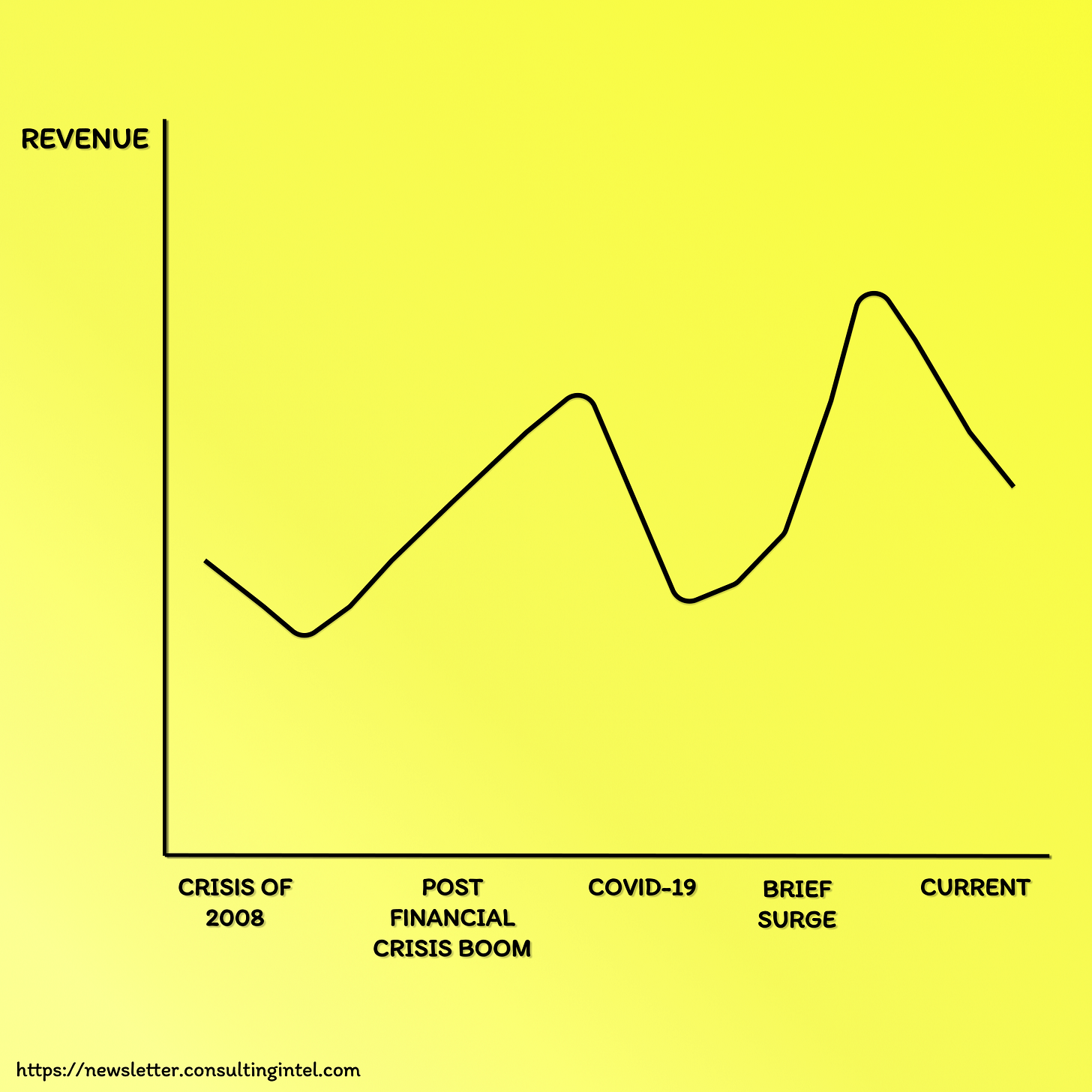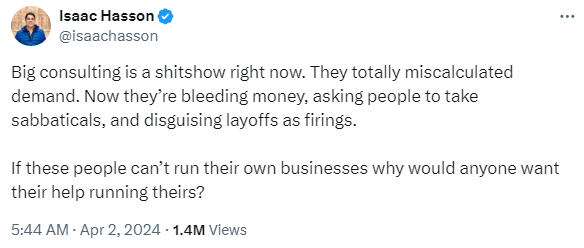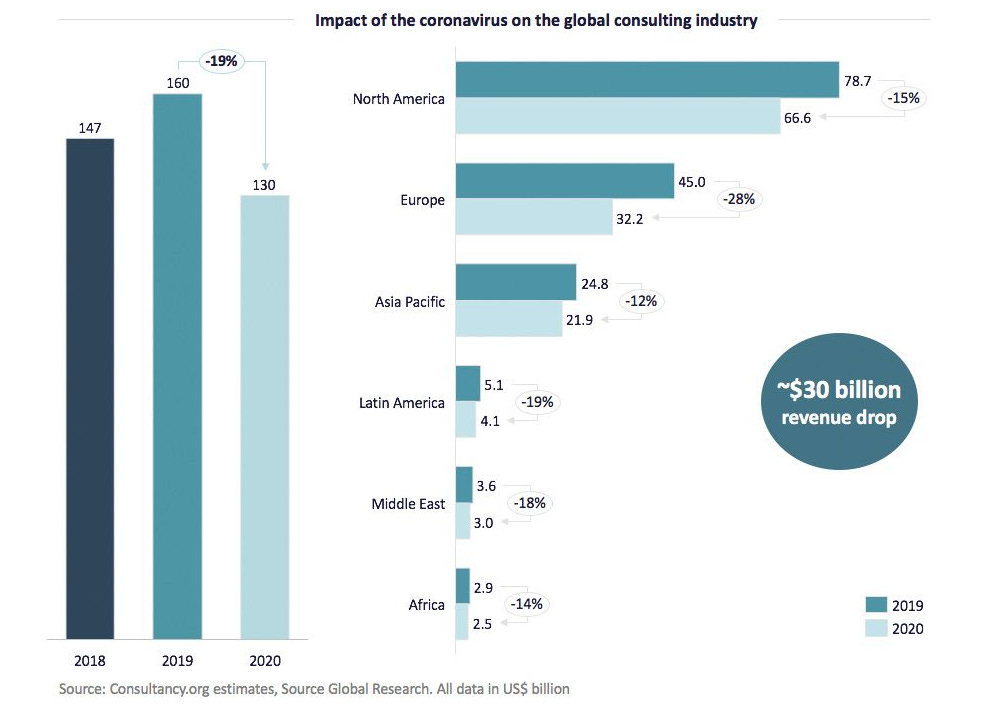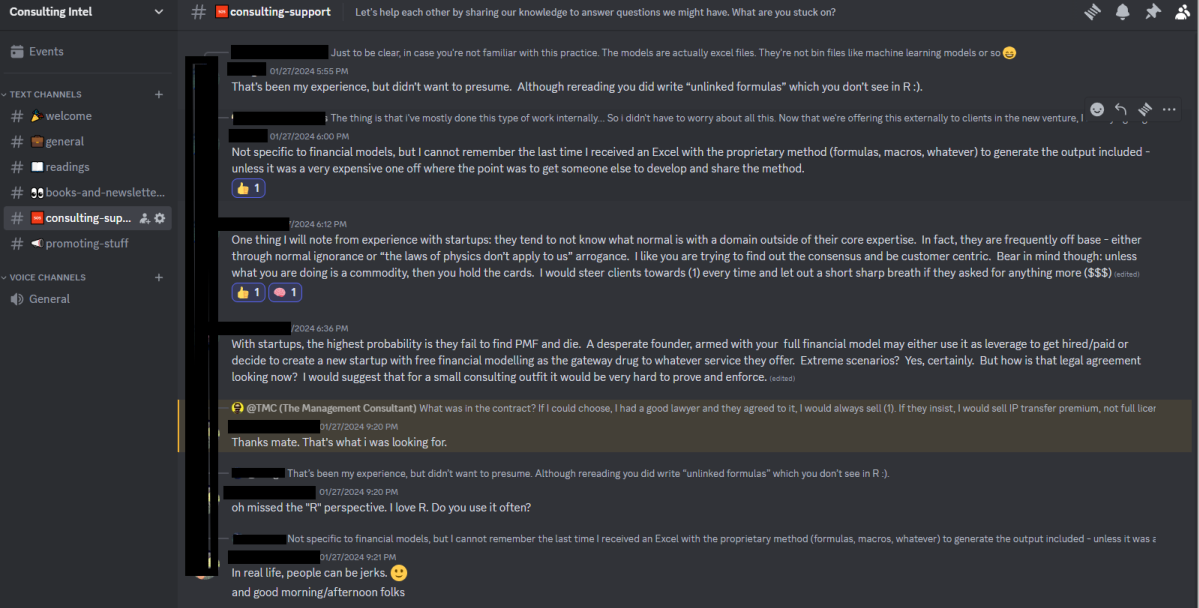Uncertain times make more resilient consultants
Consulting is a cyclical industry. Where are we moving towards?
Hello to the 1,501 subscribers who read Consulting Intel!
While the consulting world is facing uncertain times, this is not the end of the road.
Like any industry, consulting has its good and bad times: it is a cyclical business, and once you have been through a few of these cycles you start recognizing them.
I stumbled into this post on 𝕏 some days ago and I couldn’t help shaking my head to the clickbaity nature of the message.
The guy made tons of views, and I’m sure there are people out there that actually believed that reasoning.
Don’t fall for it.
Let’s take a closer look at what’s really happening and what might come next.
Consulting as an industry usually follows the economy’s lead when it comes to overall financial health because big client organizations, such as government bodies and large enterprises, have clear mandates.
When times are good, they want to grow, so they invest in strategic programs for expansion.
When times are bad, they want to rationalize and streamline their business processes. Thus, they spend money on operational optimization and cutting inefficiencies.
Good consulting companies are normally able to offer valuable propositions in these two scenarios, but when times are uncertain businesses tend to adopt a wait-and-see approach, which stalls consultancies revenue as clients hoard cash to mitigate future risk.
This time, the impact has been a bit harsher, predominantly because of the sequence of events that started with the COVID-19 pandemic.
Before the pandemic, the industry was booming, with lots of work for everyone.
After the Financial Crisis of 2008, and the 18 months that followed, the business world entered a straight bull market that lasted for a decade… before that bat in Wuhan (or the lab leak, whichever theory you choose to believe) quite literally brought everything to a halt.
Firms had to adapt quickly to working from home, and many consulting projects were put on hold unless deemed critical.
Discretionary spending was abruptly cut.
These estimates show that Covid-19 reduced the size of the consulting industry by 19%, from $160 billion in 2019 to $130 billion in 2020.
Surprisingly, a couple of quarters into the pandemic, things started to pick up again.
Companies needed help adjusting to new ways of working, such as remote work and generating online sales, and a bunch of money was helicoptered into the economy by various Central Banks, which stimulated it enough that consultants were busy again.
This led to a lot of hiring, especially within big tech firms and virtually all consulting organizations out there, who were suddenly again out on the hunt for more people, to handle all the novel work generated by the latest buzzwords.
Things went exceptionally well for a couple of years - I personally booked my record year in 2022.
Whatever I was pitching, I was able to sell.
In 2023, total industry revenue was forecasted to rise between 6% and 10%.
It felt good, but because I wasn’t born yesterday, I already knew those good times were going to end sooner rather than later.
In mid-late 2023, other major events including wars in Europe, energy issues, and rising prices, started affecting the global economy.
These issues didn’t lead to a full recession (at least, not yet) but made companies very cautious about spending money, including splurging their budget on consulting gigs.
This ultimately led to less work for consultants.

Because of all the hiring during the busy times, there are now more consultants than there is work for them.
Simple supply and demand dynamics.
With too many consultants and not enough projects, we witnessed the following 3 challenges:
Waiting for work: many new consultants have to wait a long time before they can work on their first project. They are sitting on the bench, which is never a nice place to be…
Limited choices: it’s hard for people to get the kind of projects they want, which can be disappointing and, over the long-term, can lead to dissatisfaction, quiet quitting, burn-out or the whole lot.
Tough competition: even thinking about leaving for a better job and exit opportunity is difficult because many others are trying to do the same thing, making the move very competitive.
What happened then?
Several consultancies out there, and basically all tech giants, have been in redundancy mode for the last few quarters.
In February 2023, MBB laid off up to 2,000 employees globally, including roles in human resources, technology, and communications. Most of the affected employees didn’t have direct client contact and were focused on support functions.
According to Bloomberg, McKinsey is planning to cut jobs in April 2024 that will affect around 3% of the company’s 12,000 specialists and will include roles in design, data engineering, cloud, and software.
According to Vacancysoft, job openings at consultancies across the UK plummeted by more than 80% in 2023, with MBB posting only 248 vacancies last year compared with 1,389 in 2022.
Again, nothing too strange here.
These companies had overhired in the good times, and now that forecasts are softer they must cut costs.
In consulting, firms typically hire for strategic roles that do not have to be immediately deployed.
In good times, it’s fine to have a bit of bench because business is flowing in.
You want bench because when a new project starts you are ready to recognize that revenue by deploying people immediately. The upside is significantly larger than paying a salary for a month or two to a few consultants on the bench.
When pipeline dries up though, and no new contracts come in, for a while, firms have to look at their cost.
Something that is often not highlighted in the news is that, in most large consulting firms, a lot of operational roles are being rationalized, including business support functions like marketing, HR, and recruiting.
While the layoffs of consultants have been significant, the numbers you read account for support roles too.
Lastly, consulting is really no different from any other business.
When times are good, you hire and look at costs less. When times are bad, you fire and look at costs more.
Even though things look tough right now, the consulting industry is likely to bounce back.
My prediction is that by Q4 ‘24 / Q1 ‘25, when we’ll likely have an interest rate cut, we will re-enter a state where economic expansion will drive consulting sales again.
If you’re in college, looking to get an entry in consulting, my advice is to go widen your pool of opportunities. Keep applying, and perhaps try tier-2 or tier-3 firms too. You can always repivot when the tide turns. Find small projects that you can use to acquire skills, and that can give you an edge over other applicants later on in the cycle: the internet is a fantastic place to hunt for such initiatives.
If you’re on the bench, be as visible as possible. Help with business development, call all your senior leaders and ask them how you could be of assistance in any role necessary. Spend time doing independent research and offer to help with thought leadership. Do not go in incognito mode and dissolve your presence. Keep the energy up. Companies will always struggle to get rid of top talent: make sure you are part of that elite.
If you’ve been laid off already, shit happens. Take however amount of time you need to decompress, but try your best to get back in the arena quickly. Leverage your relationships, explore opportunities online to start something on your own (this may be the nudge you were waiting for), be open to contracting roles. If you are keen to taking the plunge away, test exit opportunities in the industry. Or, well if you have a bit of an ego, just start a newsletter.
Of course, circumstances are different for all of us and it’s hard to give blanket suggestions: good advice may look very different depending on whether you have another income in the household, you have significant savings, you are a senior person with niche experience, etc
I hope some of these ideas could be useful nevertheless.
Importantly, don’t lose motivation.
The world keeps changing, and companies will always need advice on how to handle those changes.
For consultants who are flexible, willing to learn and reinvent themselves, there are still opportunities to do important work and make a difference.
I like to talk about the new wave of consulting as roboconsulting, one that becomes more efficient and able to increase productivity thanks to AI.
Such a shift is inevitable, and perhaps this is the necessary breakdown before we witness that breakthrough.
I would love to hear your stories.
What are you experiencing in your day-to-day? What is happening at your firm?
Reach out to me by e-mail, Discord, or X, or just comment below.
✍ The Management Consultant
PS: If you like this newsletter, I have one huge favor to ask.
Please spread the word. Share it with your friends and your colleagues. Ask them to subscribe.
This is the most effective way to support me (…and to keep me motivated to continue writing 😁).
Thank you 👇👇👇
🎯 INTERESTING SH*T
A few things I found on the internet that you may like…
Is working from home “morally wrong”?
A great piece by Max Nussenbaum.
The following quote is powerful: Personally, I do feel like my work is meaningful more often than not. But it’s meaningful in the same way a sunset or a really good conversation with a friend is meaningful: because even the smallest things in life are full of meaning if you know where to look, not because we’re “changing the world” every day.
🚨 SPONSORSHIP
Consulting Intel is read by more than 1,500 consultants globally.
The readers include management consultants from McKinsey, BCG, Bain, Deloitte, EY, EY-Parthenon, KPMG, PwC, Accenture, Oliver Wyman, PA Consulting, and various boutique consultancies worldwide.
Many corporate employees and independent consultants are regular readers of Consulting Intel.
If you think your products or services could resonate with this audience, get in touch!
👀 JOIN THE DISCORD SERVER
If you like this newsletter, you will love our Discord Server.
In there, you will find a tight-knit community of more than 80 management consultants from all over the world discussing real-life challenges, giving each other support and recommending the good stuff to keep our knowledge top notch.










Interesting observations. I’m also hearing that we will be gradually moving towards a more freelance economy, where companies will have less substantive employees and will bring more and more people in with specialisms for particular pieces of work. A corporate gig economy if you will. Do you think that consultants will benefit from this shift?